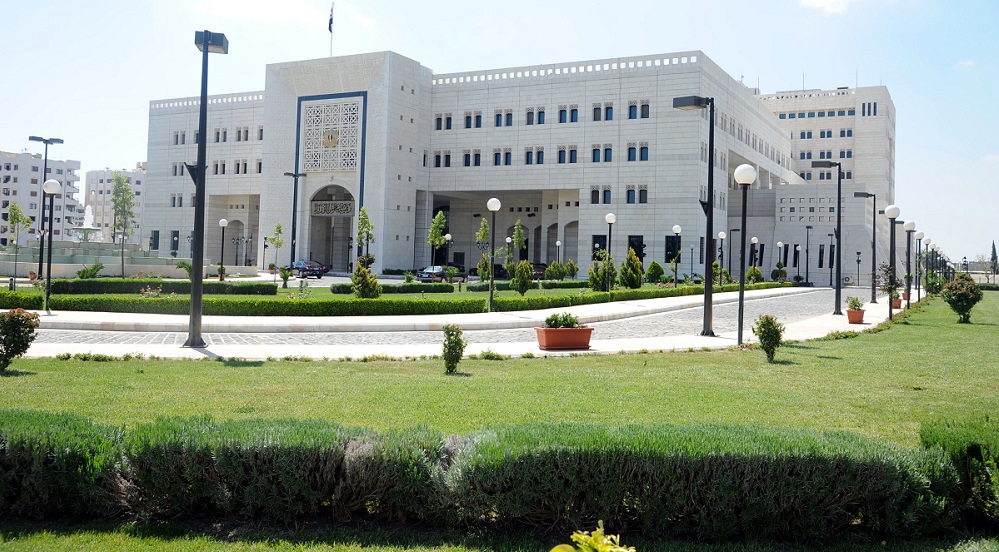Current Affairs
The Growing Power Gap
12 May, 2019
The Council of Ministers building
It has been more than four weeks since former President Omar Al-Bashir was deposed, but still the alternative did not take shape yet, thus creating a power vacuum that will have its impact on the way the country takes its future steps.
The dispute between the Transitional Military Council (TMC) on one hand and the Forces of Freedom and Change (FFC) on the other hand on how to share power reflects in fact a wider split between both camps and among them.
FFC is an umbrella that includes the Sudanese Professionals Association (SPA) that spearheaded the anti-government demonstrations, in addition to the Sudan Call that includes political parties and some of the rebel movements, who were open for a regime soft landing and accordingly involved into dialogue with the Ingaz regime through AUHIP. A third one is grouped under National Consensus Forces (NCF), mainly leftists, who are against any dialogue with the regime.
The other side of the military on the other hand is not a simple one bloc of the army. Over the years, the Ingaz regime managed to create layers of security apparatus namely: the army, the security forces and the rapid support forces hoping that they will end up defending the regime. It was the decision of these three forces to side with the demonstrators that showed the regime the exit door.
Unlike the previous two popular uprisings in 1964 and 1985, when there was a one intact military force it was easy to move and deal with. In 1964 it was initially agreed to keep Ibrahim Abboud, the head of the deposed regime as figure head for the new regime, in a way to maintain the army dignity, though that arrangement lasted only for three weeks and the civilians took over fully.
It is important to understand the complexity of the situation and bear that in mind before venturing into how to go forward.
The ideal situation would have been to enter into a partnership based on the role both carried out to reach the current situation and usher the country into a new era, but that did not happen, a situation that opens the way for divisions between the two pillars and more seriously creating this power vacuum where in effect there is no government running the day to day affairs of the country.
The longer this situation continues the more divisions are expected to show up between the TMC and FFC on one hand or more troubling create divisions within each camp specially that of the FFC.
The issue of how to deal with the TMC may constitute a watershed where those who are keen in accommodating the military fall mainly within the group that was involved in dialogue and talks with the deposed Ingaz regime.
Divisions may fall on some trade unions as well, though for a different reason as is the case with that of journalists. The journalists are one of the founding members of SPA, but there were complaints that those representing them at SPA don’t communicate fully with the main body of journalists. An attempt was made to reconcile the two, but failed and eventually the journalists took the initiative to call for electing a new body. It remains to be seen whether the new body will ask for a change of the journalists’ representatives at SPA and whether such a move will be replicated by other trade unions.
The central point is that the more this power vacuum is allowed to continue the more divisions could take place and complicate an already complicated situation.
A great possibility is that such situation represents an open invitation for foreign intervention. Already the current situation became an issue for regional and international diplomatic bodies as well as countries for interests in Sudan for whatever reason. The African Union has given Khartoum 60 days for the military to hand over power to civilians before taking punitive resolution. Washington went as far calling on TMC to deal with FFC only. But the TMC is not alone in the cold. Regional powers namely Saudi Arabia, United Arab Emirates and Egypt, are more supportive to see the military in control. With divisions rigging the domestic front the chances of foreign influence spreading is getting bigger thus posing a challenge for the revolution that was intended to restore national dignity.
E N D
SS/AS
Post your comments
Photo of the Week
Everybody alive today came from one African country (The Independent) Ariana Baio Khartoum, Jan.1 (Sudanow)-It is well known that all humans alive today can be traced back to a common ancestor but a study may have found where that ancestor originates. Researchers at the University of Oxford’s Big Data Institute mapped the entirety of genetic relationships among humans t...
MoreNew media
The Poll
Archives
-
01 January, 2023
Phone battery killed nine persons, injured twelve
Zalingei, Jan.1 (Sudanow) - A dispute over a phone battery, in Marin Market, Central Darfur, led to the killing of nine persons and injuring of another twelve. The Director of Central Darfur Police, Salah Omar Al-Tayeb told SUNA last Thursday that main reasons behind the events in Zalingei began with a dispute over a phone battery, where one of the citizens stabbed to death. The police official added that the police forces moved to th...
Sudanow is the longest serving English speaking magazine in the Sudan. It is chartarized by its high quality professional journalism, focusing on political, social, economic, cultural and sport developments in the Sudan. Sudanow provides in depth analysis of these developments by academia, highly ...
MoreRecent tweets
Tweets by Suda_nowFOLLOW Us On Facebook
Contact Us

Address: Sudan News Agency (SUNA) Building, Jamhoria Street, Khartoum - Sudan
Mobile:+249 909220011 / +249 912307547







